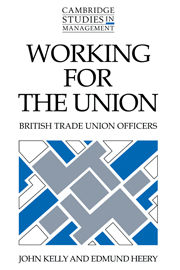Book contents
- Frontmatter
- Contents
- List of figures and tables
- Preface
- List of abbreviations
- Part 1 Introduction
- Part 2 The parameters of union work
- Part 3 The full-time officer at work
- 6 Organizing
- 7 Bargaining objectives
- 8 The bargaining process
- 9 Dealing with managers
- Part 4 Conclusions
- Appendix: Research methods
- Notes
- Bibliography
- Index of names
- Index of subjects
- Cambridge Studies in Management
9 - Dealing with managers
Published online by Cambridge University Press: 22 October 2009
- Frontmatter
- Contents
- List of figures and tables
- Preface
- List of abbreviations
- Part 1 Introduction
- Part 2 The parameters of union work
- Part 3 The full-time officer at work
- 6 Organizing
- 7 Bargaining objectives
- 8 The bargaining process
- 9 Dealing with managers
- Part 4 Conclusions
- Appendix: Research methods
- Notes
- Bibliography
- Index of names
- Index of subjects
- Cambridge Studies in Management
Summary
Management in the 1980s
The 1980s presented managers with an enormous array of changes in their social environment: economic recession, new labour laws, mass unemployment, a strongly anti-union government, a dramatic decline in trade union membership and a favourable shift in the balance of power. As managers responded to these changes and began to exploit them so the academic debates got under way. It soon became clear that there was no single, dominant management strategy, and that the widely-discussed revival of ‘macho’ management was specific to particular firms and sectors of the economy (cf. Edwardes, 1983 on BL; MacGregor, 1986 and Edwards and Heery, 1989 on British Coal; and more generally Batstone, 1988, chapter 5; Edwards, 1987, chapter 5). Another argument suggests that personnel issues have become increasingly central to competitiveness and hence the rise of the personnel manager under the new label of ‘human resource manager’. Human resource management seeks both to motivate employees and to secure their commitment to the objectives of the company. In some accounts, it tries to replace traditional, or adversarial industrial relations with a new, more cooperative employee relations policy, very much akin to the high-trust unitarism described by Fox (1966; see Guest, 1989; Keenoy, 1990; Marchington and Parker, 1990; Storey, 1989, 1992). Despite pluralist-inspired academic attacks on ‘unitarism’, it was clear from national surveys of managers that the majority of British managers in the late 1970s and early 1980s strongly endorsed some key unitarist propositions (e.g. Poole et al, 1981). They were strongly committed to the idea of a harmony of interests between worker and employer and hostile to industrial democracy and to trade union power.
- Type
- Chapter
- Information
- Working for the UnionBritish Trade Union Officers, pp. 173 - 186Publisher: Cambridge University PressPrint publication year: 1994



